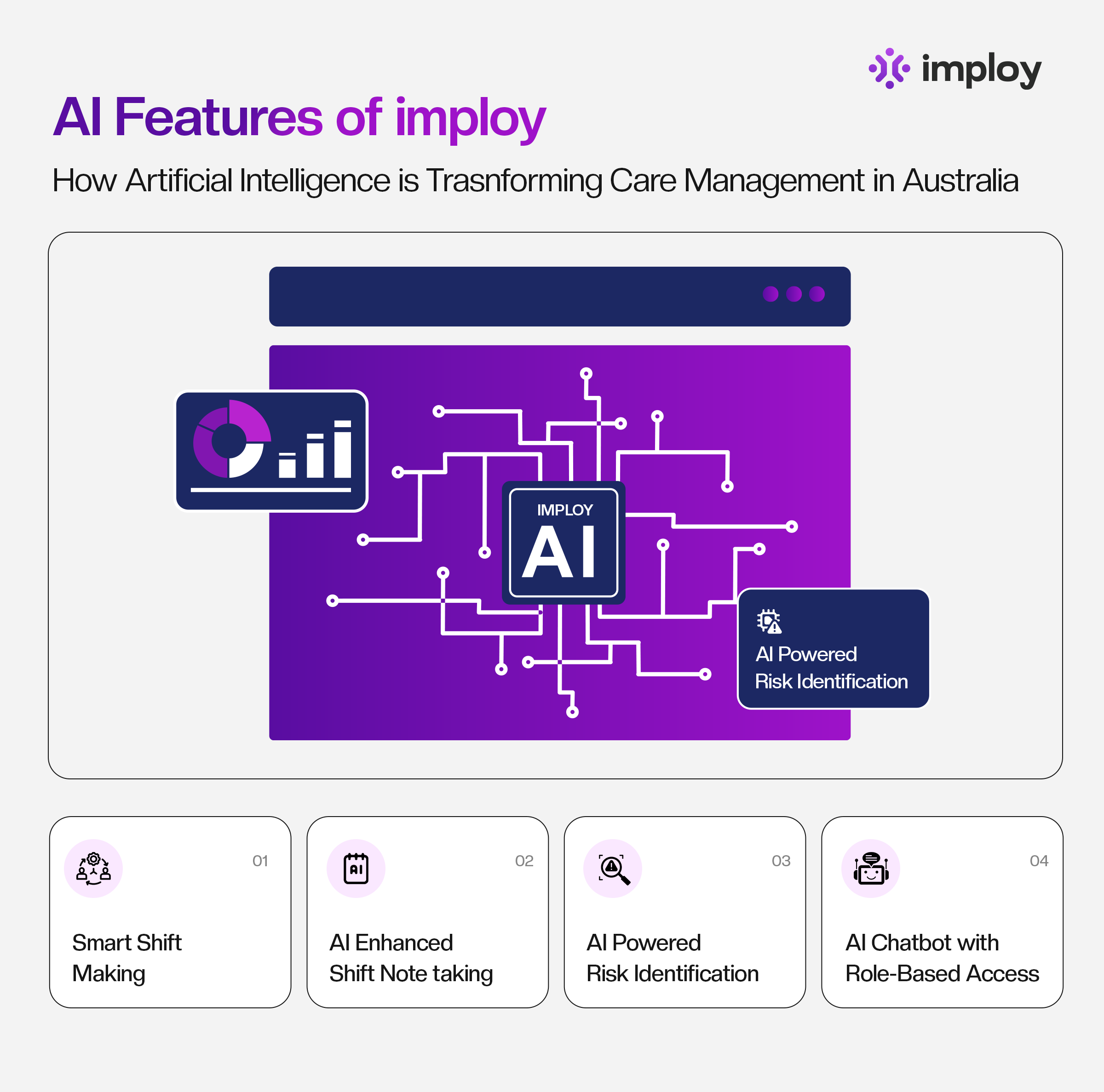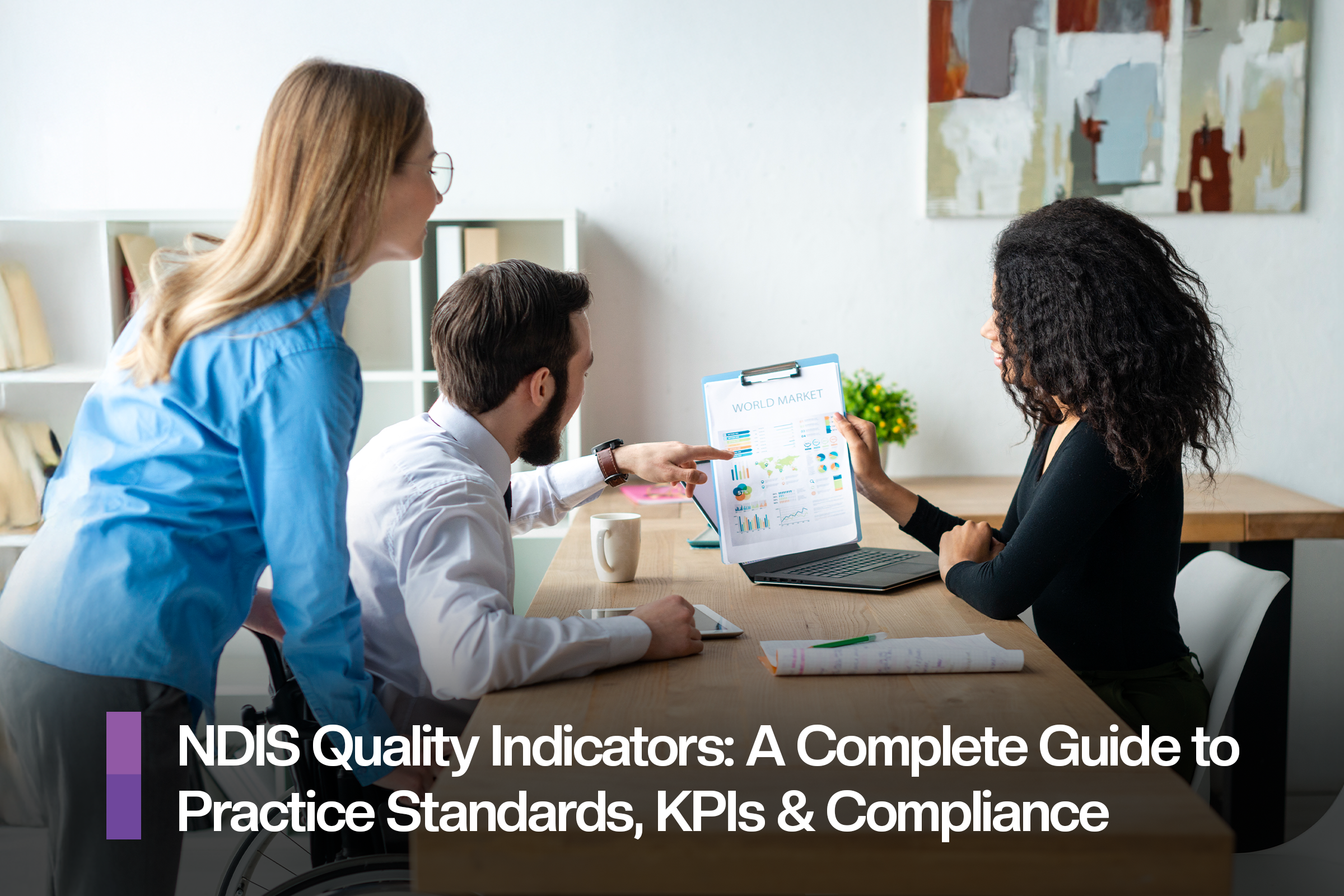AI Features of Imploy: Transforming Care Management in Australia
Discover how imploy’s AI features transform care management in Australia with smart rostering, AI chat bots, risk alerts, and enhanced documentation.

The Australian care sector - particularly aged care and disability support faces growing pressure to deliver quality services while managing complex compliance and workforce challenges. Providers are expected to do more with less: juggling staff rostering, funding compliance, risk management, and detailed documentation.
This is where imploy stands out. As an all-in-one care management platform, imploy not only streamlines operations but also integrates Artificial Intelligence (AI) into its core workflows. These AI-powered features go beyond simple automation, helping providers enhance efficiency, ensure compliance, and ultimately improve client outcomes.
In this blog, we’ll explore the key AI features of imploy and how they’re shaping the future of care management in Australia.

Why Does AI Matters in Care Management?
Care providers face daily challenges like - last-minute roster changes, incomplete progress notes, compliance audits, and risks that can be overlooked in day-to-day operations. Traditional systems often add to the admin burden rather than reducing it.
AI helps bridge this gap by:
- Automating repetitive tasks like matching workers to shifts.
- Improving accuracy and compliance in documentation.
- Identifying risks early, enabling providers to act before issues escalate.
- Saving valuable time, allowing staff to focus on delivering care instead of chasing paperwork.
With demand for home care and NDIS services growing, AI-driven tools are no longer optional, they’re becoming essential.
Key AI Features of imploy
imploy doesn’t just manage care operations, it adds intelligence to them. By embedding artificial intelligence into its platform, imploy helps providers move from reactive administration to proactive, data-driven decision-making. Here’s a closer look at its key AI features that are transforming care delivery.
1. Smart Shift Matching
Rostering in aged care and disability support isn’t just about filling a vacancy, it’s about ensuring the right worker is matched to the right client at the right time. Traditional rostering often relies on manual decision-making, which can be time-consuming and prone to errors, especially when dealing with last-minute changes or a large workforce.
imploy’s Smart Shift Matching uses AI to take the complexity out of this process. The system automatically evaluates a range of factors to recommend the most suitable worker for each shift, including:
- Skills and qualifications: Ensuring workers have the proper training, certifications, and experience to meet a client’s care needs.
- Location and travel distance: Reducing travel time for workers, cutting down on transport costs, and ensuring clients receive timely support
- Availability and shift preferences: Respecting worker schedules while filling shifts efficiently.
- Continuity of care: Prioritising the same carer for ongoing support, building trust and familiarity between client and worker.
This intelligent matching process results in fewer rostering conflicts, reduced last-minute cancellations, and higher satisfaction for both clients and staff. Providers benefit from smoother operations, while clients enjoy more consistent and personalised care.
In short, Smart Shift Matching helps care organisations save time, reduce stress, and deliver a higher quality of service - all powered by AI.
2. AI-Enhanced Shift Notetaking
Shift notes are a vital part of care management—they form the communication bridge between support workers, managers, and healthcare professionals. Yet in practice, notes are often written in a hurry, using shorthand or fragmented sentences. Many support workers also come from diverse language backgrounds, which means grammar and spelling can sometimes make notes difficult to interpret. Over time, these inconsistencies can create challenges for compliance, audits, and even continuity of care.
imploy’s AI-Enhanced Shift Notetaking feature solves this problem by automatically improving the quality of carers’ documentation. Using natural language processing, the system can:
- Correct spelling and grammar to ensure clarity.
- Reformat and structure notes so they are consistent across the organisation.
- Refine language to make entries more professional and easy to understand.
For example, a raw note such as “clnt walk park, look sad” can be enhanced into:
“Client went for a walk in the park. They appeared quiet and somewhat withdrawn, which may indicate low mood. Will continue to monitor and encourage engagement in activities.”
This enhanced version provides a clearer, more complete picture of the client’s wellbeing, making it easier for managers, case coordinators, or auditors to understand what actually happened during the shift.
The benefit is twofold:
- For workers: It reduces the pressure of writing perfect notes, especially for those who may be less confident in English.
- For providers: It ensures that every entry is professional, consistent, and audit-ready, saving managers valuable time on corrections and reviews.
Ultimately, AI-Enhanced Shift Notetaking elevates everyday documentation from “rough notes” to reliable clinical insights, strengthening both compliance and the quality of care.
3. AI-Powered Risk Identification
Managing risk is one of the most critical responsibilities for care providers. Small details in shift notes, such as changes in eating habits, mobility, or mood can be early warning signs of bigger issues. However, in a busy care environment, these subtle indicators are easy to overlook, especially when managers are reviewing dozens of notes every day.
imploy’s AI-Powered Risk Identification addresses this challenge by automatically analysing shift notes and assigning a risk score on a scale of 0 to 10. This gives managers an instant snapshot of potential concerns without having to comb through every entry manually.
For example:
- A routine entry like “Client had breakfast” may receive a 0, showing no immediate concern.
- A more concerning note such as “Client refused to eat for two days” might generate a high-risk score, triggering an alert for staff to follow up promptly.
The system doesn’t just flag nutrition-related issues, it can also highlight patterns linked to medication adherence, mental health, social isolation, or physical wellbeing. By surfacing these risks early, providers can intervene before problems escalate into emergencies.
4. AI Chatbot with Role-Based Access
imploy is preparing to launch an AI-powered chatbot designed to make everyday tasks faster and more intuitive. Instead of navigating through multiple menus or reports, staff will be able to simply type or ask a natural language question like “Show me tomorrow’s open shifts” or “What’s the current balance of Client A’s NDIS plan?”.
What makes this tool even more powerful is its role-based access control. This means the chatbot only shares information relevant to the user’s position and permissions. For example:
- A support worker may use it to check upcoming shifts, client care notes, or travel details.
- A care coordinator might access risk alerts, staff availability, or incident reports.
- A finance or admin officer could ask about invoice status, payroll data, or funding balances.
This role-specific design ensures data security while giving every team member the ability to access the information they need instantly. The chatbot also reduces training overheads, since staff don’t need to learn complex software navigation, just ask a question in plain English.
By combining natural language processing with secure access, the AI chatbot has the potential to become a digital assistant for the entire organisation, helping staff save time, reduce errors, and focus more on client care.
Benefits for Providers
By embedding AI into daily operations, imploy delivers significant advantages for care providers:
- Time Savings: Less admin, more focus on client care.
- Better Compliance: Documentation is accurate, polished, and audit-ready.
- Risk Management: Early warnings allow for proactive interventions.
- Workforce Efficiency: Smarter rostering reduces no-shows and scheduling stress.
- Inclusivity: Language support for carers improves communication and professionalism.
Real-World Application
imploy has already begun piloting its AI features with providers like My Companionship, an aged care organisation. Early results have been promising:
- Managers find the risk scoring system invaluable for spotting issues at a glance.
- Carers appreciate how AI improves their notes without adding extra workload.
- Rostering has become faster and more accurate, saving admin staff hours each week.
This real-world testing shows that imploy’s AI isn’t just a futuristic idea, it’s a practical tool making a measurable difference today.
Final Thoughts
The integration of AI into care management is no longer a “nice to have”, it’s becoming an essential part of delivering safe, compliant, and efficient services in Australia’s aged care and disability support sectors.
imploy demonstrates how AI can move beyond automation to actually enhance decision-making, improve documentation, and support early risk detection. By reducing administrative pressures and strengthening compliance, providers can redirect more time and energy to what truly matters: delivering compassionate, person-centred care.
As the demand for home care and NDIS services continues to grow, organisations that embrace AI-powered tools will be better positioned to meet rising expectations from clients, families, and regulators. imploy’s intelligent features - ranging from smart rostering to risk identification and role-based chatbots are setting a new benchmark for what care management systems can achieve. The future of care is not just digital, it’s intelligent, and imploy is leading the way in making that future a reality today.
Frequently Asked Questions (FAQs)
1. What makes imploy’s AI different from other care management systems?
Most platforms focus on basic rostering and documentation. imploy goes further by embedding AI into daily workflows, such as risk identification, note enhancement, and role-based chatbot access helping providers move from reactive admin to proactive decision-making.
2. Is imploy’s AI secure when handling sensitive client information?
Yes. imploy follows strict Australian compliance standards and uses role-based access to ensure staff only see information relevant to their position. This protects client privacy while still improving workflow efficiency.
3. Can AI really identify risks that humans might miss?
Yes. imploy’s AI scans shift notes for subtle patterns, such as repeated meal refusals or mood changes, and assigns a risk score. This doesn’t replace human judgment but gives managers an early alert to investigate further.
4. Do staff need special training to use imploy’s AI features?
No. Features like Smart Shift Matching and the AI chatbot are designed to be intuitive. The chatbot, for example, allows staff to simply ask questions in plain English rather than navigating complex menus.
5. Will AI replace human decision-making in care?
Not at all. imploy’s AI is designed to support, not replace, care providers. It automates repetitive tasks and highlights potential risks, but final decisions always remain with the human care team.





